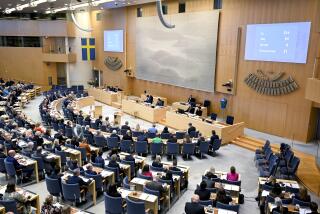Even Spanking Is Outlawed : Once-Stern Sweden Leads Way in Children’s Rights
- Share via
STOCKHOLM — In the 9th and 10th Centuries, the Vikings regularly practiced infanticide, killing babies considered unlikely to survive the harsh northern climate.
Centuries later, Scandinavians were still practicing what was called anglamakersaj , or angel-making. Certain women would take unwanted children and dispose of them, sometimes through adoption, sometimes by simply allowing them to die.
And as recently as 1899, a Swedish newspaper counseled: “Flog your son while there is still hope. Foolishness resides in the heart of the child. Flogging drives it out.”
More recently, however, Scandinavia in general and Sweden in particular have led the way in establishing children’s rights.
In 1949, Sweden adopted a Code of Parenthood and Guardianship specifying that the more violent forms of child punishment were to be avoided. In 1966, the right of parents to use physical punishment was eliminated from the code, though spanking was not banned.
In 1979, though, the spanking of children was specifically forbidden by Swedish law; the statute states that no child may “be subjected to physical punishment or other humiliating treatment.”
“Our aim was to send a symbolic message that there are other ways to raise a child,” said Bertil Ekdahl, one of the authors of the law. “Beating is not teaching.”
That goal has been attained according to Ake W. Edfeldt, a professor of educational psychology at the University of Stockholm and an authority on physical punishment.
“In the old days,” he said, “it was a good father who hit his child. Today, it is seen as bad. So, the law has worked. It has changed attitudes.”
Sweden also was the first country to have special ombudsmen to look after the rights of children. The word ombudsman is itself Swedish, and means “one who works for the interests of others.”
One of Sweden’s largest voluntary agencies dealing with children, Save the Children, now has five ombudsmen, who investigate complaints about child abuse or neglect.
An estimated 95% of Swedish parents are aware that spanking is illegal, Ekdahl said, and 98% of the children are aware of their rights. This is so, in part, because the legislation was widely publicized; children were alerted by means of messages on milk cartons.
There originally was concern that children would take advantage of their new rights and fabricate charges against their parents. However, since 1979, only two children have gone directly to the police with complaints against their parents. In both cases, which were highly publicized, the fathers were convicted of assault and fined.
Would a no-spanking law work in the United States?
“Yes, absolutely,” said Anitha Ronstrom, an ombudsman with Save the Children who is regarded as Sweden’s leading authority on the subject of child abuse. “The United States should pass an anti-spanking law. And they should start with the schools. We banished corporal punishment in the schools more than 20 years ago.”
More to Read
Sign up for Essential California
The most important California stories and recommendations in your inbox every morning.
You may occasionally receive promotional content from the Los Angeles Times.













